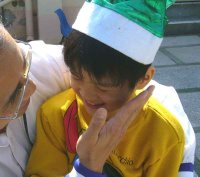 With the demolition of the Star Ferry Terminal in Central, yet another Hong Kong landmark is being removed from the collective memory of the Hong Kong people. The building probably does not have a lot of architectural merit. But it is evidently something that many of us have very found memories about, both personal and social. It is something that makes up part of the identity of Hong Kong.
With the demolition of the Star Ferry Terminal in Central, yet another Hong Kong landmark is being removed from the collective memory of the Hong Kong people. The building probably does not have a lot of architectural merit. But it is evidently something that many of us have very found memories about, both personal and social. It is something that makes up part of the identity of Hong Kong. Apparently the government thinks that is it neither old enough nor valuable enough to preserve. If we keep tearing down things that are not that old, there will never be anything old enough to preserve, will there? If we keep valuing things by how much cash can be generated from it, there will only be taller and taller high rises in Hong Kong. No wonder the numerous beautiful green trees on the hill of the old Marine Headquarters in Tsim Sha Tsui have been turned into 3 miserable looking trunks in giant flower pots suspended in mid air.
Green hills and trees don’t generate any cash. Yet someone is willing to pay billions for the land. So let us remove the hill and clear the way for more money making. Some of you want to keep some of the oldest ones? Put a few of them in giant flower pots! Somehow there seems to be a depressing consistency in government thinking.
Great cities are great not just because they are commercially successful. The people of such cities can inevitably point to a collective identity that they can be proud of – a collective identity of history, culture, people, events, and symbols. Hong Kong is no double a successful commercial city. But the destruction of the Star Ferry Terminal is yet another indication that our government seems determined to remove anything in the way of development - defined narrowly to include only monetary gain.
In so doing, whatever collective identity that has been built over the years is being killed bit by bit.
 Some of the kids at the special school recognized me from previous visits. One kid that I met the first time several years back as a toddler was now 12. His lips and mouth were still purple because of some chronic health problems. But he was talking excitedly, hugged me many times, and joined in all the games. Another girl was about 5, I believe. She could not talk, walk, hold anything with her hands, nor even sit up. But when I held her, she showed me the most beautiful contented smiles. She was twisting and turning all the time, making it difficult and tiring to hold her. But I just couldn’t bear to put her down.
Some of the kids at the special school recognized me from previous visits. One kid that I met the first time several years back as a toddler was now 12. His lips and mouth were still purple because of some chronic health problems. But he was talking excitedly, hugged me many times, and joined in all the games. Another girl was about 5, I believe. She could not talk, walk, hold anything with her hands, nor even sit up. But when I held her, she showed me the most beautiful contented smiles. She was twisting and turning all the time, making it difficult and tiring to hold her. But I just couldn’t bear to put her down. 
